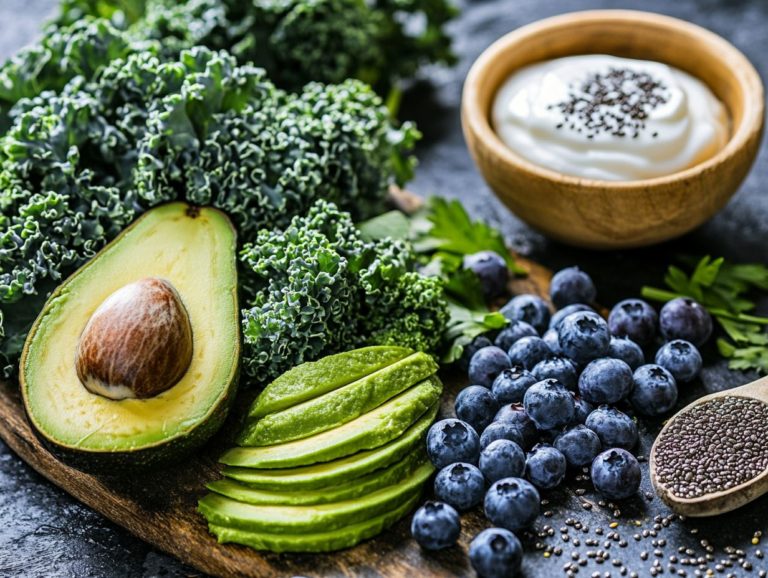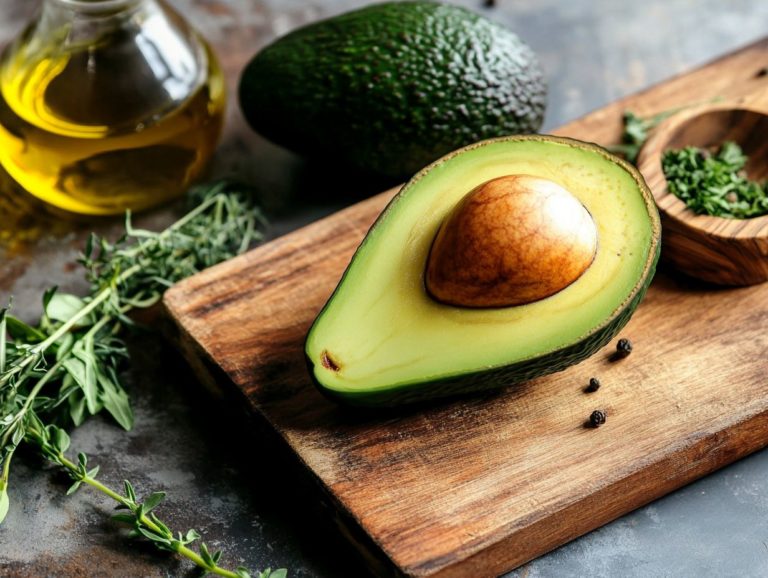Moringa: The Miracle Superfood You Need
Moringa is drawing considerable attention for its exceptional nutritional profile and numerous potential health benefits.
Brimming with essential vitamins and minerals, this leafy green is not only versatile in the kitchen but also offers many advantages for your overall health and wellness.
Let’s explore what makes Moringa special, how you can seamlessly incorporate it into your daily diet, and the precautions you should consider.
Uncover how this powerhouse plant can elevate your health!
Contents
Key Takeaways:
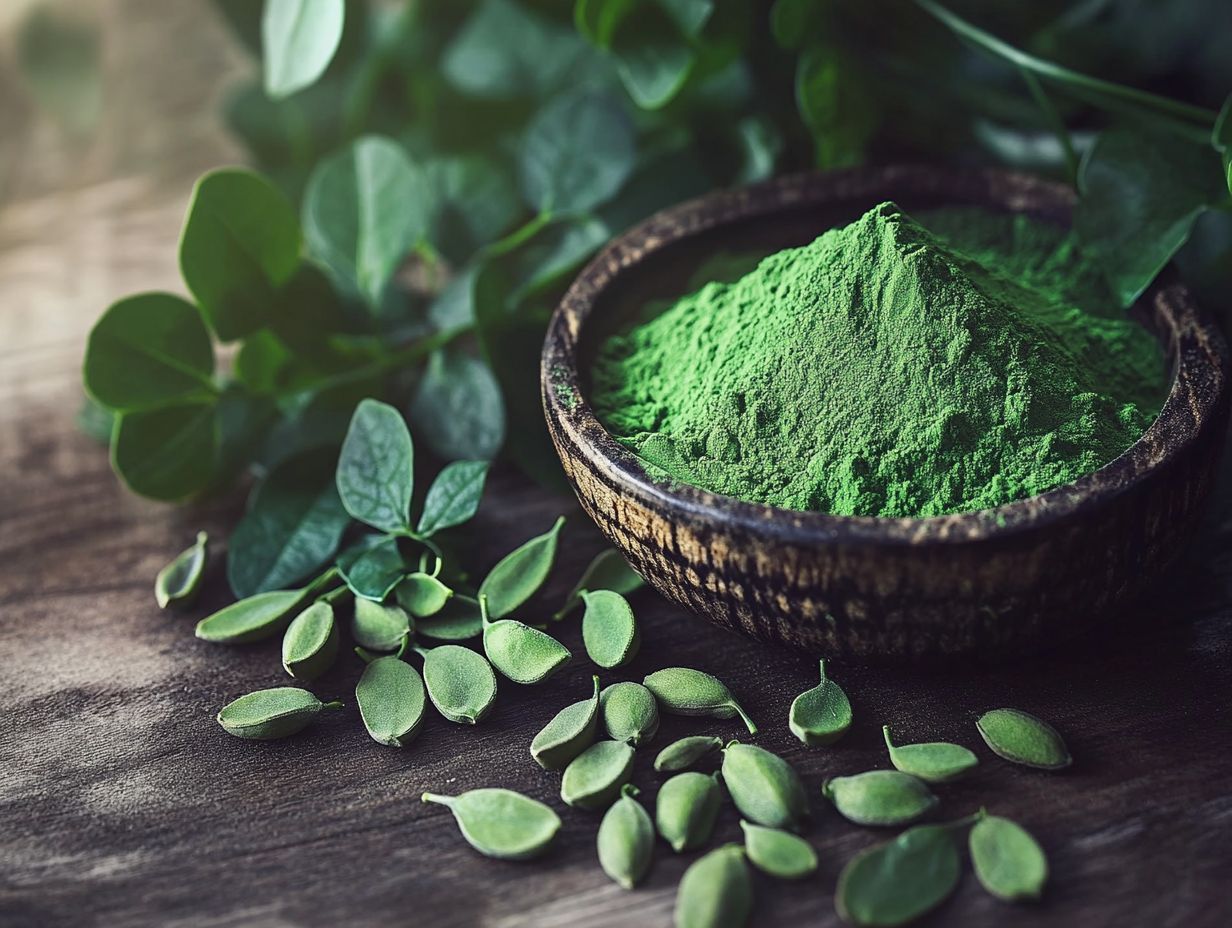
- Moringa offers many health benefits, including improving overall wellness.
- It contains unique vitamins and minerals that support your diet.
- Be aware of potential side effects when including Moringa in your diet.
What is Moringa?
Moringa, scientifically recognized as Moringa oleifera, stands out as a very healthy food, capturing your attention with its impressive health benefits and nutritional prowess.
Hailing from the foothills of the Himalayas, this remarkable plant is often dubbed the ‘miracle tree’ because of its extensive applications in traditional medicine and its reputation as a premium organic dietary supplement.
With its abundant array of vitamins, minerals, and antioxidants, Moringa becomes an invaluable asset to your modern wellness regimen, effectively tackling concerns such as malnutrition and long-term inflammation that can cause health issues.
Overview of the Superfood
People celebrate Moringa as a superfood, offering an impressive array of nutritional benefits that enhance overall wellness.
This remarkable plant is particularly abundant in vitamins A and C, along with calcium nutrients essential for maintaining a robust immune system and promoting healthy skin.
By incorporating Moringa into your diet, you’re not just boosting your personal health; you’re also embracing a sustainable solution for food security, especially in regions grappling with malnutrition.
Its ability to grow well even with little water makes it an ideal crop in the face of climate change challenges, ensuring a reliable source of nutrition that can help communities adapt to shifting environmental conditions.
Nutritional Benefits of Moringa
The nutritional benefits of Moringa are truly remarkable, offering you a protein-rich dietary supplement that brims with essential vitamins and minerals.
With an abundance of vitamin C, calcium, iron, and a host of antioxidants, Moringa can elevate your health in numerous ways.
Key Vitamins and Minerals
Moringa is a powerhouse of essential vitamins and minerals, boasting a high concentration of vitamin C, calcium, and iron, making it an exceptional choice for enhancing your health.
Beyond these key nutrients, Moringa is also loaded with vitamin A, potassium, and a variety of antioxidants that are crucial for maintaining immune function, supporting bone health, and promoting cellular repair.
Research from esteemed organizations such as the World Health Organization and the Food and Agriculture Organization underscores Moringa’s potential as a valuable dietary supplement, particularly in areas grappling with malnutrition.
These insights suggest that by incorporating Moringa into your daily diet, you can effectively address nutrient deficiencies and contribute positively to your overall wellness and vitality.
Start incorporating Moringa today and feel the difference in your health!
Comparison to Other Superfoods
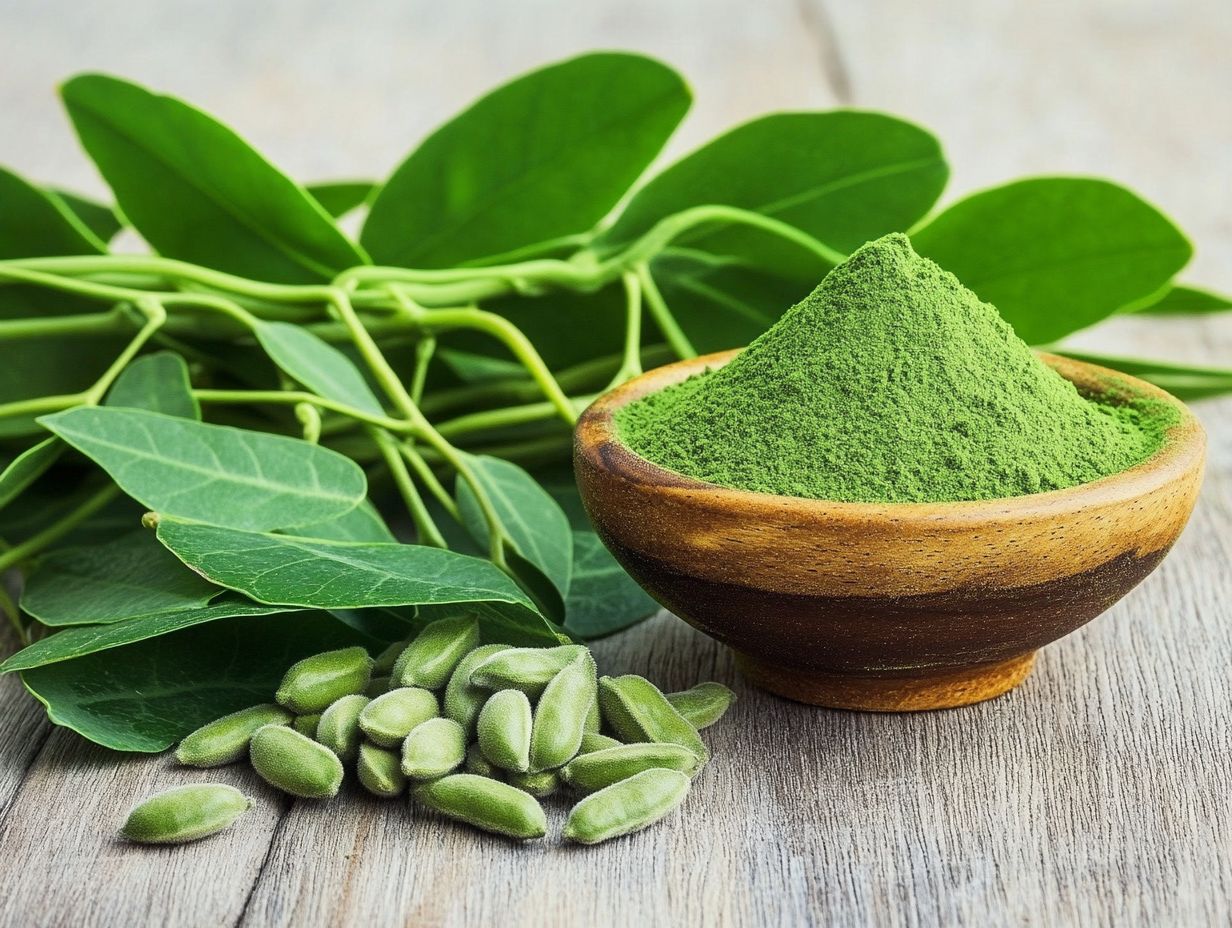
Moringa truly shines when compared to other superfoods like quinoa and turmeric. It has a superior nutritional profile and impressive antioxidants that help protect your cells.
This leafy green powerhouse is packed with vitamins A, C, and K, along with lots of protein and calcium. This makes it a versatile addition to your diet.
Quinoa is a complete protein source, but it doesn t match the vitamin density of Moringa. Turmeric is known for its anti-inflammatory effects, but it can’t compete with the broad nutrients found in Moringa.
Adding Moringa to your smoothies, soups, or as a supplement allows you to enjoy its benefits. If you’re looking to enhance your health, Moringa is a fantastic choice!
Potential Health Benefits of Moringa
Moringa offers extensive health benefits. It has remarkable anti-inflammatory properties and can help manage ongoing health issues like diabetes.
Improving Overall Health and Wellness
Moringa stands out for its antioxidants, which fight chronic inflammation. These antioxidants, such as flavonoids and phenolic acids, neutralize harmful free radicals and boost your body s defenses.
Historically, Moringa has enhanced vitality and longevity. This wisdom is echoed in modern diets that stress the importance of nutrient-rich foods.
Integrate Moringa into daily meals whether in powder form, capsules, or as fresh ingredients to elevate your immune function, increase energy, and improve skin health.
The blend of ancient remedies with contemporary nutrition makes Moringa a compelling part of your wellness journey.
Managing Chronic Conditions
Moringa is celebrated for its role in managing chronic inflammation and diabetes. Its nutrient profile is impressive.
This superfood is rich in vitamins A, C, and E, essential amino acids, and antioxidants. These make it a fantastic addition to your health routine.
Research shows that Moringa s anti-inflammatory properties may reduce inflammation markers, vital for those with conditions like arthritis. Studies also indicate that Moringa leaves may help lower blood sugar levels by improving insulin sensitivity.
Blend Moringa powder into smoothies, teas, or soups for an easy nutritional boost that addresses specific health concerns.
Incorporating Moringa into Your Diet
Adding Moringa to your diet can significantly enhance your wellness. It also helps tackle food security and malnutrition in communities.
This superfood offers a wealth of nutrients that can help you thrive while contributing to the betterment of those in need.
Ways to Prepare and Consume Moringa
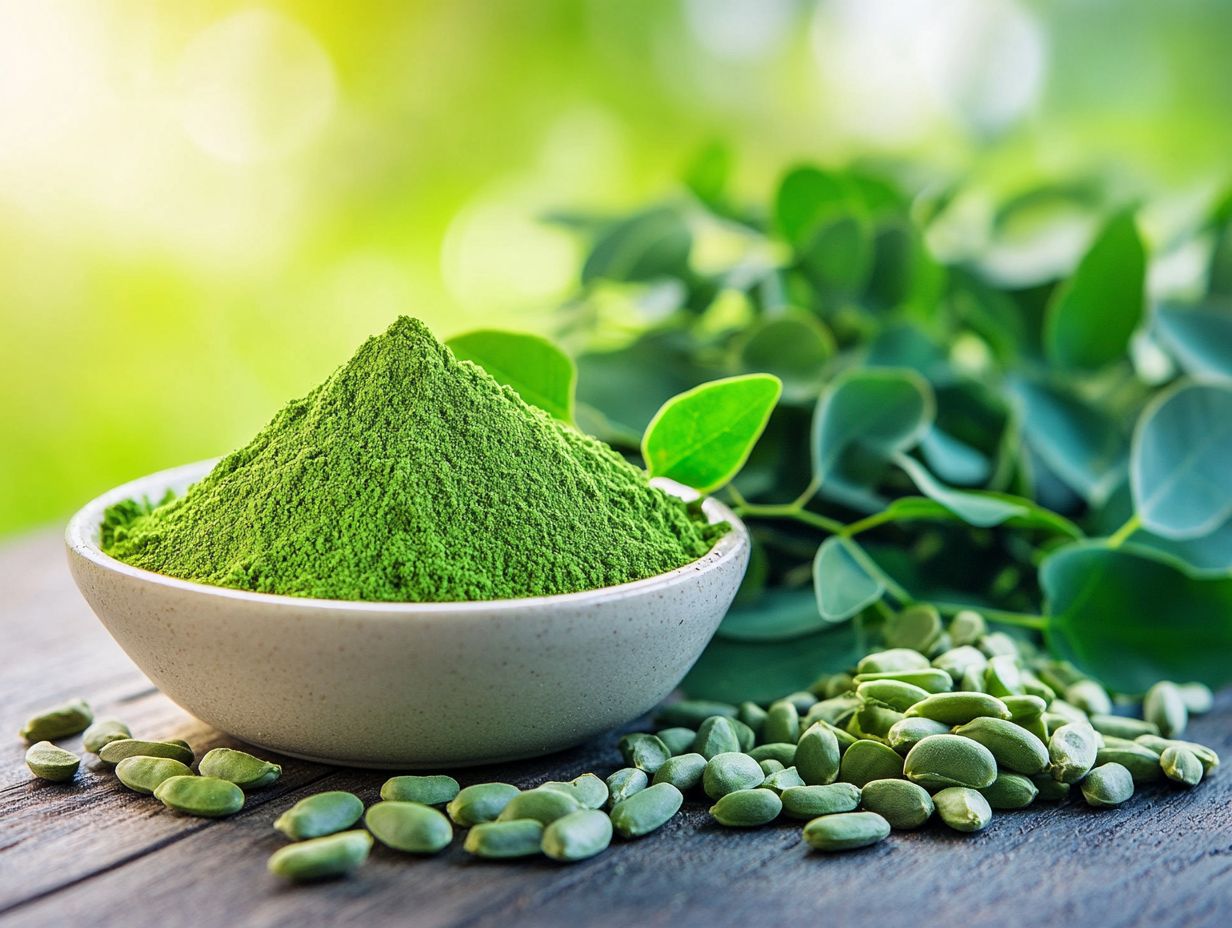
You have a wealth of options when it comes to preparing and enjoying Moringa, whether you prefer its powdered form, a soothing tea, or a delightful addition to smoothies. This versatility makes it a truly remarkable dietary supplement. You can seamlessly incorporate Moringa powder into soups and sauces, enriching them with its impressive array of vitamins and minerals.
If you’re looking for a calming beverage, tea made from Moringa leaves offers a delightful alternative, packed with antioxidants that can elevate your wellness routine. Imagine enhancing your morning smoothie with a spoonful of Moringa powder it’s a simple way to boost nutritional value without sacrificing flavor.
For an innovative twist, consider using Moringa in energy bars or protein bites, transforming your snacks into healthier options that fit perfectly into your busy lifestyle. These preparation methods not only make Moringa a pleasure to consume but also maximize its health benefits, leaving you feeling revitalized and nourished.
Know the Side Effects and Precautions!
While Moringa is typically regarded as safe for consumption, it s crucial to consider potential side effects and necessary precautions, especially if you’re incorporating it into a traditional medicine regimen.
When to Avoid Moringa
Certain individuals should think twice before incorporating Moringa into their routines, especially if they have specific health conditions or are on certain medications, to avoid any unwelcome side effects. For example, if you struggle with low blood pressure, Moringa could lower it even more. If you’re taking medications that prevent blood clotting, proceed with caution; this superfood can amplify their effects, increasing the risk of excessive bleeding.
Pregnant women should also avoid Moringa, as some compounds in the plant may induce contractions, posing risks for both mother and fetus. It’s always wise to consult a healthcare provider before considering its use, particularly if you have underlying health issues or are undergoing medical treatment. Your safety and well-being are paramount.
Safety Precautions to Take
To ensure the safe consumption of Moringa, follow specific precautions, especially when integrating it into your traditional medicine practices. This exotic plant is celebrated for its impressive nutritional benefits and medicinal properties, offering significant health advantages.
However, be aware of potential interactions with other medications. Adhering to recommended dosages typically ranging from 1 to 2 teaspoons of powdered leaves daily is essential. Exceeding this amount might lead to gastrointestinal discomfort, which may include symptoms like bloating or cramps. Consulting with your healthcare provider is crucial, particularly if you are pregnant or breastfeeding, have underlying health conditions, or are currently on medication.
This will help you prevent any adverse reactions and ensure a well-rounded approach to your wellness journey.
Frequently Asked Questions
What is Moringa and why is it called a miracle superfood?
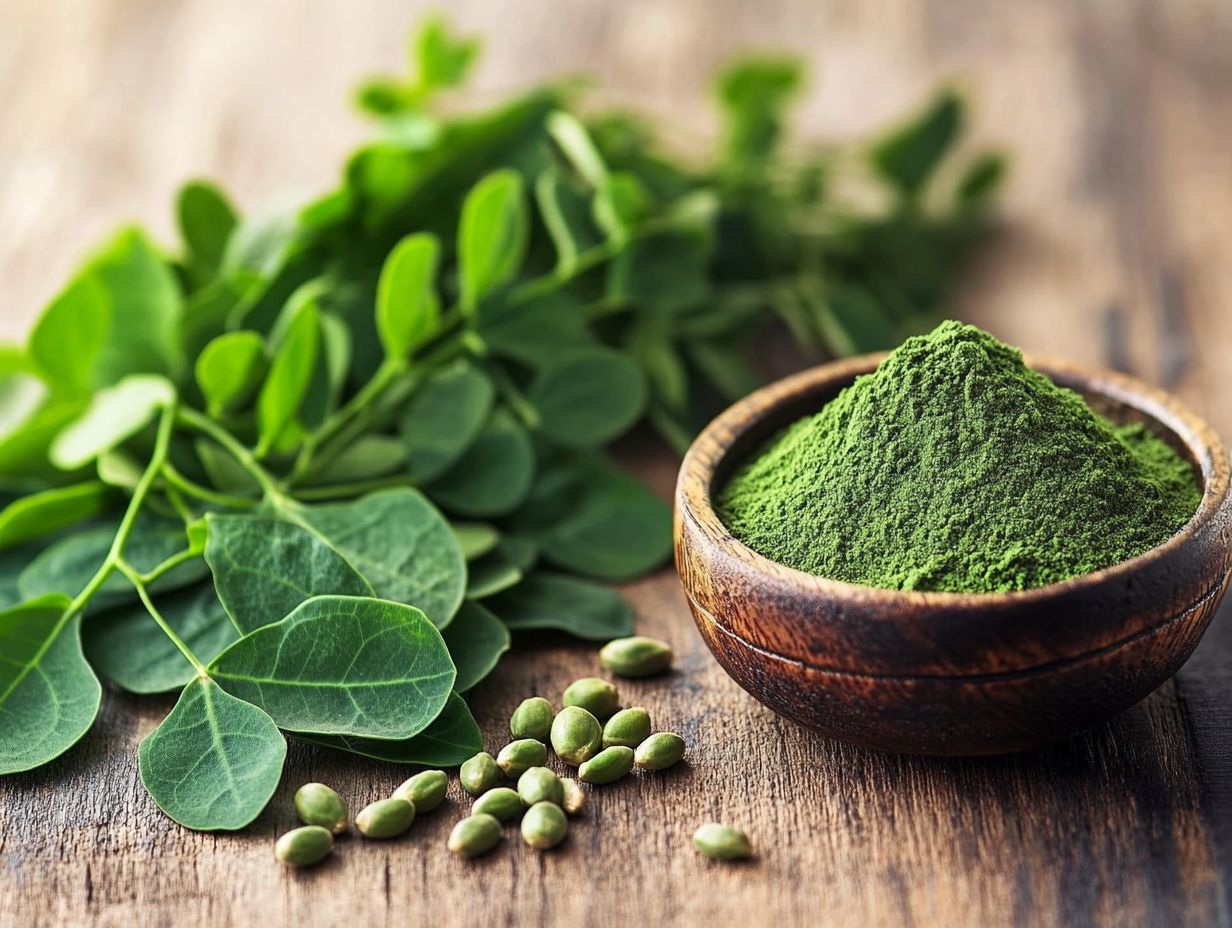
Moringa is a tree native to India, also known as the “Miracle Tree” due to its numerous health benefits. It is called a superfood because it contains a high concentration of essential vitamins, minerals, and antioxidants that can improve overall health and well-being.
How can Moringa benefit my health?
Moringa is rich in essential nutrients, including vitamins A, C, E, and B-complex, calcium, iron, and magnesium. These nutrients can boost immunity, improve digestion, increase energy levels, and reduce inflammation in the body.
Can Moringa help with weight loss?
Yes, Moringa can aid in weight loss as it is low in calories, high in fiber, and can help regulate blood sugar levels. It also has a high protein content, which can help you feel fuller for longer and reduce cravings for unhealthy snacks. Don’t miss out on this incredible superfood!
Is Moringa safe for consumption?
Yes, Moringa is generally safe to consume. However, it’s crucial to consult a healthcare professional before adding new supplements, especially if you have existing health issues or take medications.
Are there any side effects of consuming Moringa?
Most people experience no side effects from Moringa. Some may feel mild symptoms like nausea or stomach discomfort.
If these issues continue, stop taking Moringa and reach out to a healthcare professional.
How can I incorporate Moringa into my diet?
You can enjoy Moringa in many delicious ways! Add the powder to smoothies or juices, toss the leaves into salads or stir-fries, or take it as a capsule supplement.
Moringa is also available in tea, oil, and other forms for easy consumption.



